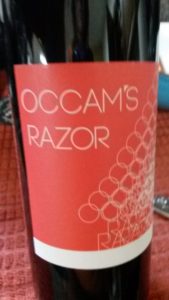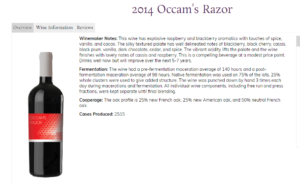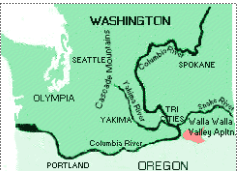
Origin: Columbia Valley & Walla Walla, Washington State, Rasa Vineyards
Grape: Shiraz, Cabernet, and small amounts of Malbec, Merlot and Sangiovese
Body: Medium
Year: 2014
Alcohol: 2%
Price point: $16.00
Year Reviewed: 2017
This wine kicks butt! Found this wine at a wine tasting in Geneva, Il and bought a bottle to enjoy one Sunday afternoon. Was going to go run/walk, but opened this with lunch and let me say, just wanted to relax and enjoy this gem of a wine. Let this breathe for about 1 hour after opening to get the full complexity of this beautiful wine.
This clear Ruby colored wine blew me away. On the nose, I get cherry, allspice, mocha, currant jam, earth and mineral. On the palate, I receive medium tannins, a beautiful complex well balanced wine with buttery vanilla cherry flavors—doesn’t that sound just great? It surely is. I even get some mild characteristics of the Nebbiola grape, which is not in here, but I believe the Malbec is adding to the complexity of this wine. I also suggest that after about 2 glasses of this wine you read about the philosophy of “Occam’s Razaor. See below. Try with some blue cheese. OMG!
History[edit]
The term Occam’s razor did not appear until a few centuries after William of Ockham‘s death in 1347. Libert Froidmont, in his On Christian Philosophy of the Soul, takes credit for the phrase, speaking of “novacula occami“.[6] Ockham did not invent this principle, but the “razor”—and its association with him—may be due to the frequency and effectiveness with which he used it.[7] Ockham stated the principle in various ways, but the most popular version, “Entities are not to be multiplied without necessity” (Non sunt multiplicanda entia sine necessitate) was formulated by the Irish Franciscan philosopher John Punch in his 1639 commentary on the works of Duns Scotus.[8]
Formulations before Ockham[edit]
Part of a page from Duns Scotus’ book Ordinatio: “Pluralitas non est ponenda sine necessitate“, i.e., “Plurality is not to be posited without necessity”
The origins of what has come to be known as Occam’s razor are traceable to the works of earlier philosophers such as John Duns Scotus(1265–1308), Robert Grosseteste (1175–1253), Maimonides (Moses ben-Maimon, 1138–1204), and even Aristotle (384–322 BC).[9][10]Aristotle writes in his Posterior Analytics, “We may assume the superiority ceteris paribus [other things being equal] of the demonstration which derives from fewer postulates or hypotheses.”[11] Ptolemy (c. AD 90 – c. AD 168) stated, “We consider it a good principle to explain the phenomena by the simplest hypothesis possible.”[12]
The Indian Hindu philosopher Madhva (1238–1317) in verse 400 of his Vishnu-Tattva-Nirnaya says: “dvidhAkalpane kalpanAgauravamiti” (“To make two suppositions when one is enough is to err by way of excessive supposition”).[citation needed]
Ockham[edit]
William of Ockham (circa 1287–1347) was an English Franciscan friar and theologian, an influential medieval philosopher and a nominalist. His popular fame as a great logician rests chiefly on the maxim attributed to him and known as Ockham’s razor. The term razor refers to distinguishing between two hypotheses either by “shaving away” unnecessary assumptions or cutting apart two similar conclusions.
While it has been claimed that Ockham’s razor is not found in any of his writings,[15] one can cite statements such as Numquam ponenda est pluralitas sine necessitate [Plurality must never be posited without necessity], which occurs in his theological work on the ‘Sentences of Peter Lombard’ (Quaestiones et decisiones in quattuor libros Sententiarum Petri Lombardi (ed. Lugd., 1495), i, dist. 27, qu. 2, K).
https://en.wikipedia.org/wiki/Occam%27s_razor

http://rasavineyards.orderport.net/product-details/0119/2014-Occams-Razor
PRODUCER The Naravane brothers, Makrand (Pinto) and Yashodhan (Billo) were born in India and came to the United States in 1974, when they were 7 and 5. Both parents worked to establish themselves economically and in the community. The brothers learned many lessons from these experiences and most profoundly, the importance of hard work and following your heart. In 2007, the brothers formed Rasa Vineyards. Rasa is Sanskrit for ‘essence’ and ‘juice’. The word encapsulates the brothers’ heritage and winemaking philosophy, which is rooted in maximizing the most authentic expression of terroir. Prior to following their passion for wine, life was centered around the Computer Industry. Lucky for them (and us) they made the move, though the qualities that served them in the tech industry, namely an attention to detail, and a high level of organization and thoughtfulness, continue to serve them today. Their 28-acre estate, 9 of which are planted to Syrah as of 2016, is located in the newly established Rocks District of Walla Walla. They are also fortunate enough to source fruit from the very best and many of the oldest vineyards in the region, specifically DuBrul, Monette and Kiona Vineyards. Practices in the vineyard and winery are minimal and intended to reveal the character of the site.
https://www.communalbrands.com/wp-content/uploads/2017/08/OccamsRazor.pdf
After learning more about this wine region, I definitely want to visit here. For more information on Walla Walla Wineries, select this link:

http://www.winesnw.com/walla.html
